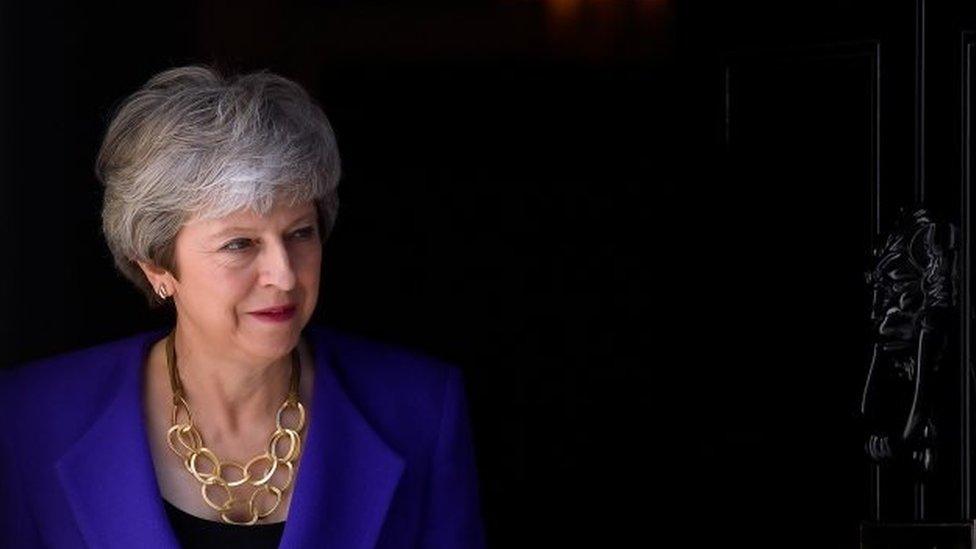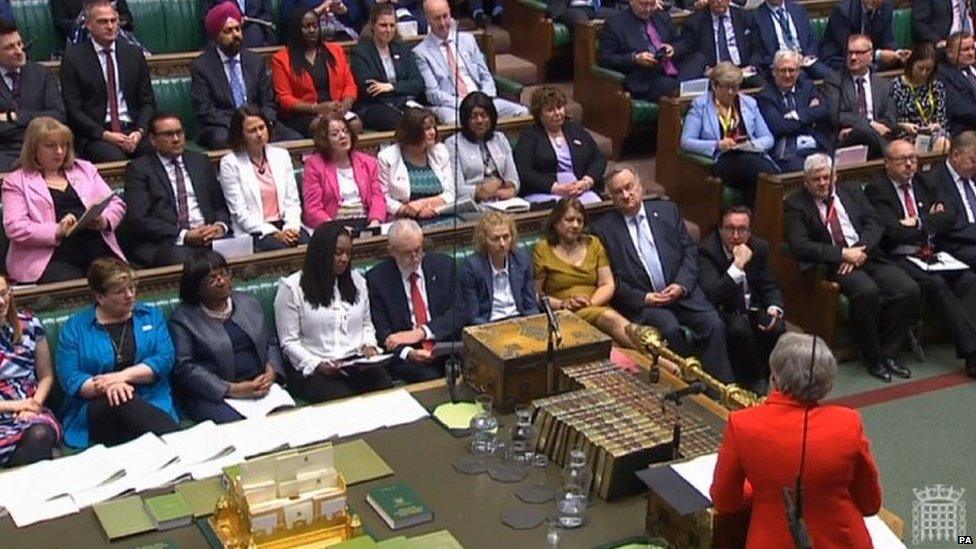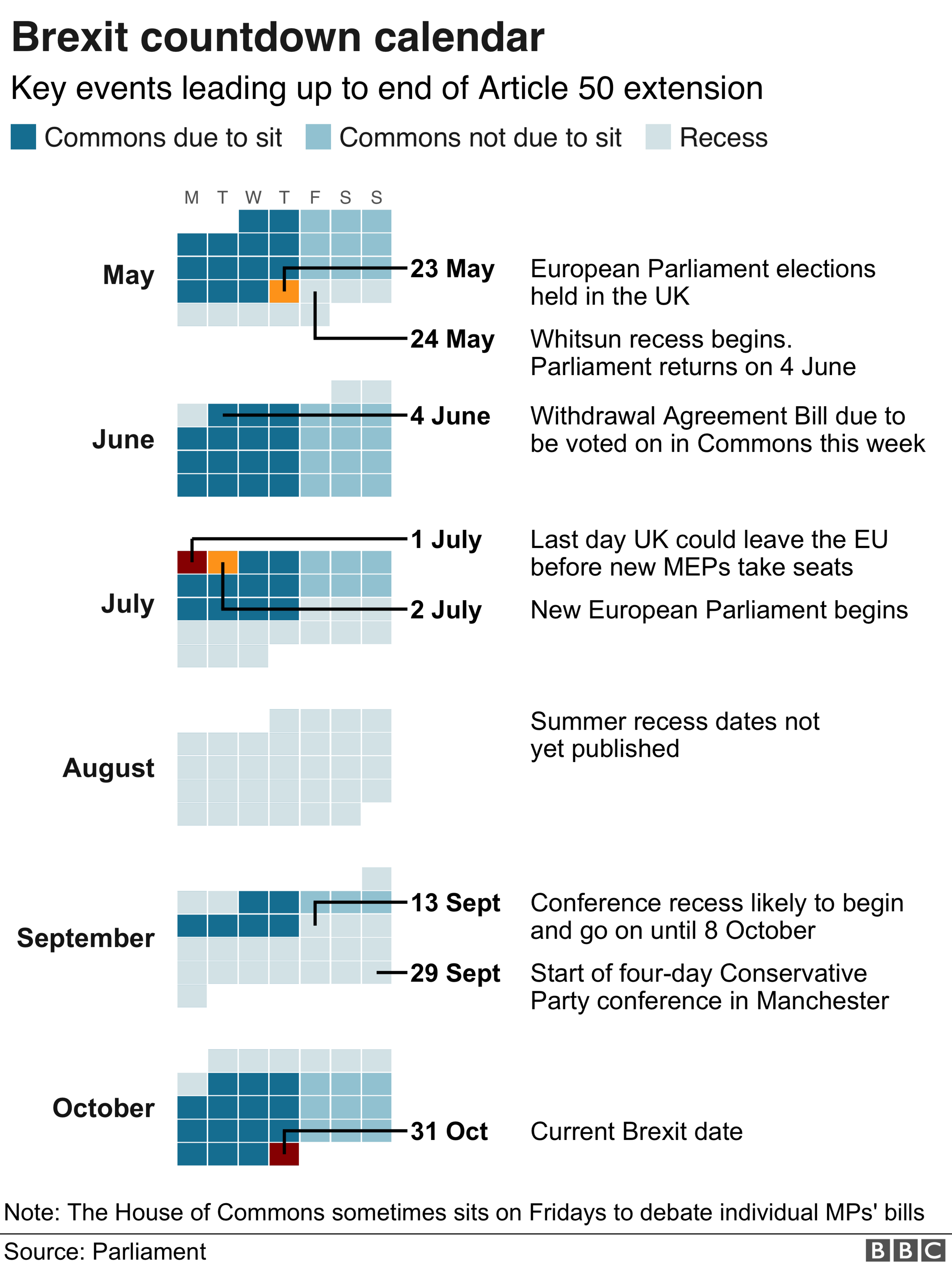Brexit bill: PM sets out details of customs compromise
- Published
- comments

Theresa May is setting out the details of a series of compromises designed to try and win the support of Labour MPs for her Brexit plan.
The cabinet earlier agreed the idea of a temporary customs relationship until the next general election, and measures on the environment and workers' rights.
These will be included in the Withdrawal Agreement Bill, to be put to a vote in the Commons in early June.
The SNP and some Tory Brexiteers have already said they will vote against.
The PM briefed MPs and ministers on the contents of the speech - entitled "A new Brexit deal - seeking common ground in Parliament" - beforehand.
Allow X content?
This article contains content provided by X. We ask for your permission before anything is loaded, as they may be using cookies and other technologies. You may want to read X’s cookie policy, external and privacy policy, external before accepting. To view this content choose ‘accept and continue’.

The Withdrawal Agreement Bill is legislation required to bring the withdrawal agreement negotiated with the EU into British law.
MPs have rejected the withdrawal agreement three times, and talks with Labour on finding a compromise deal acceptable to their MPs broke down last week.
Downing Street said there was a "shared determination" in cabinet to find a way of passing the legislation although it conceded "strong opinions" had been aired on how best to do this.
At the meeting, Mrs May told her ministers: "The Withdrawal Agreement Bill is the vehicle which gets the UK out of the EU and it is vital to find a way to get it over the line."
No 10 said the bill, when it was published, would contain "some significant new aspects".
International Development Secretary Rory Stewart suggested on Sunday that the government and Labour were "half an inch apart" on key issues and "sensible" Labour MPs could be won round.
But shadow foreign secretary Emily Thornberry said she believed her colleagues would vote against the Withdrawal Agreement Bill as she had heard there was "no radical difference" in what was being offered.

The easy bit?

Theresa May is hoping to win over enough Labour MPs to counteract Tory rebellion
By BBC deputy political editor John Pienaar
For Theresa May getting her cabinet behind her plan for another push towards a Brexit deal was the easy bit.
Ministers agreed legislation to deliver Brexit should be the vehicle for compromises to bring enough Labour MPs on board to counteract the still strong rebellion by those on her own side.
The plan supersedes the idea of so-called indicative votes in the Commons on Brexit options.
The problem is that opposition on the Conservative side has probably hardened, not softened, since her last failed attempt.
The hope in Downing Street is that those wanting another referendum or a form of Brexit that keeps us closer to the EU may back this bill and try and get their way during later detailed debate.
The emphasis now is on hope and perhaps not very much of it.

Ms Thornberry told BBC Radio 4's Today that She said Labour was still pushing for a customs union with the EU and close alignment with the single market after Brexit.
However, Commons leader and Brexiteer Andrea Leadsom said she would back the bill "so long as it continues to be leaving the European Union", which she defined as being outside both of those structures.
She also stressed the need to be prepared for a no-deal Brexit, telling Today: "What I do think is that for any negotiation to succeed, you have to be prepared to walk away."
Remaining within a customs union would avoid the need for tariffs (taxes) to be imposed on goods moving between the UK and the EU, but many Brexiteers feel it would also prevent Britain making the clean break from Brussels that they want.
'Dead on arrival'
If the bill passes its first parliamentary hurdle - known as second reading - in early June, MPs will then have an opportunity to propose changes as they examine it in detail.
It is thought some Labour MPs who oppose Brexit and want another referendum might be tempted to back the bill in the hope of inserting another public vote into it later on.
However, several Tories - including former Brexit Secretary David Davis - have said they will vote against the bill at the first opportunity precisely to stop this happening.
Ex-minister Mark Francois, a vocal critic of the prime minister, said if the vote was held today the bill would be defeated by a huge margin.
He told the BBC that MPs who had backed the PM in the past would be "more reluctant" to do so if the party got a drubbing in the European elections and she would have to rely on Labour votes to get her way.
"Unless she is rescued by a Marxist, the Withdrawal Agreement Bill is dead on arrival," he told Radio 4's World at One.
Mr Francois dismissed comments to be made later by Philip Hammond, who will warn prospective Conservative leadership contenders against "hijacking" Brexit by "knowingly inflicting" a damaging no-deal exit on the economy.
The chancellor will tell business leaders that there is "no mandate" for such a no-deal exit and that even with "all the preparation in the world" it would be highly damaging.
Is the UK in a crisis over leaving the EU?
Mr Francois said the chancellor was a "Remain fanatic" and he suggested the public increasingly backed leaving with a deal and trading with the EU using World Trade Organization rules.
On Sunday, Brexit Party leader Nigel Farage said that was now "the only way the democratic will of the people can be delivered".
The UK was originally due to leave the EU on 29 March, but the deadline was pushed back when MPs failed to approve Mrs May's deal.
When the new deadline was announced, the government said it would "continue to make all necessary preparations" for a no-deal Brexit, after it was reported that departments had stood down their planning.

